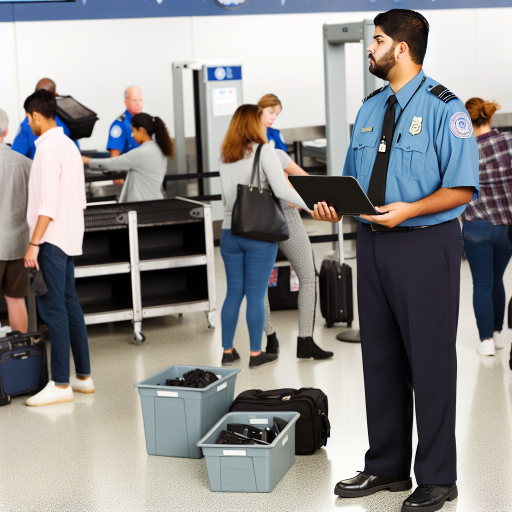Introduction:
Physical fitness is crucial for security agents to effectively perform their duties.
It ensures they can handle the physical demands of the job.
Importance of Physical Fitness for Security Agents:
Security agents often face challenging situations that require them to be physically fit to respond quickly and effectively.
Specific Physical Fitness Requirements:
Security agents must meet specific physical fitness requirements such as cardio endurance, strength, agility, and flexibility to perform their duties effectively.
Importance of Physical Fitness for Security Agents:
Physical fitness is crucial for security agents to perform their duties effectively.
Being physically fit can help in emergency situations where quick response is necessary.
Benefits of Physical Fitness for Security Agents:
- Improved Strength and Endurance: Physical fitness enables security agents to handle long hours of standing and patrol duties.
- Enhanced Agility and Flexibility: Being physically fit helps security agents to react quickly to unpredictable situations.
- Cardiovascular Health: Good physical fitness reduces the risk of heart-related issues during high-stress situations.
- Mental Alertness: Regular exercise boosts cognitive function, allowing security agents to make quick decisions on the job.
- Injury Prevention: Being physically fit reduces the chances of strains, sprains, and other physical injuries while on duty.
Physical Demands of the Job:
- Vigilance: Security agents must stay alert and focused for long periods, which requires mental and physical stamina.
- Physical Restraint: In emergency situations, security agents may need to physically restrain individuals, requiring strength and agility.
- Patrolling: Walking or running long distances while carrying equipment is a regular part of the job for security agents.
- Emergency Response: Security agents must be able to respond quickly to threats or emergencies, which requires physical readiness.
- Teamwork: Working with a team to secure an area or handle a crisis situation demands coordination and physical communication.
Training for Physical Fitness:
- Cardiovascular Exercise: Running, cycling, or swimming can help improve endurance and cardiovascular health for security agents.
- Strength Training: Weightlifting and bodyweight exercises build muscle strength, which is essential for physical tasks on the job.
- Flexibility and Mobility: Stretching and yoga can improve agility and reduce the risk of injuries for security agents.
- High-Intensity Interval Training (HIIT): HIIT workouts simulate the intensity of emergency situations, preparing security agents for quick responses.
- Functional Training: Exercises that mimic job-related movements can help security agents perform their duties more efficiently.
Specific Physical Fitness Requirements:
Security agents must meet specific physical fitness requirements to perform their duties effectively.
These requirements are essential to ensure that security agents can handle the physical demands of the job.
Here are the standards for strength, endurance, agility, and overall physical health that security agents must meet:
Strength:
- Security agents need to have adequate strength to handle physical confrontations and restrain individuals if necessary.
- Strength training exercises such as weightlifting, push-ups, and squats are crucial for building and maintaining strength.
- Agents should be able to lift and carry heavy objects, as well as maintain their posture and balance during challenging situations.
Endurance:
- Security agents must have good cardiovascular endurance to be able to patrol for long hours and respond quickly in emergencies.
- Running, cycling, and swimming are excellent ways to improve endurance and stamina for security agents.
- Regular aerobic exercise can help agents build the endurance they need to handle the physical demands of their job.
Agility:
- Agility is crucial for security agents to respond swiftly to changing situations and move quickly in confined spaces.
- Agility training exercises such as ladder drills, shuttle runs, and plyometric jumps can improve coordination and quick movements.
- Security agents must be able to change directions quickly, react to sudden threats, and navigate obstacles with ease.
Overall Physical Health:
- Security agents need to maintain overall physical health to endure the physical and mental stress of the job.
- Proper nutrition, hydration, and rest are essential for security agents to recover and stay healthy.
- Regular medical check-ups, including cardiovascular and musculoskeletal assessments, are crucial for maintaining overall health.
Meeting these specific physical fitness requirements is vital for security agents to perform their duties effectively and ensure the safety and security of the people they are assigned to protect.
You Might Also Like: Forensic Scientist: Career Path and Education Guide
Training Programs for Security Agents:
Physical fitness is a crucial aspect of being a security agent.
It directly impacts their ability to perform their duties effectively.
In order to meet the physical fitness requirements of this profession, security agents need to engage in specific training programs.
These programs focus on strength, flexibility, endurance, and overall wellness.
Below are some training programs that can help security agents maintain optimal physical fitness levels:
- CrossFit:
- High-Intensity Interval Training (HIIT):
- Functional Training:
- Circuit Training:
- Strength Training:
- Running and Cardiovascular Exercises:
CrossFit is a high-intensity workout program that combines elements of weightlifting, cardio, and gymnastics.
It is known for its scalability, making it suitable for individuals at all fitness levels.
CrossFit can help security agents build strength, improve endurance, and enhance overall physical fitness.
HIIT involves short bursts of intense exercise followed by brief rest periods.
Transform Your Career Today
Unlock a personalized career strategy that drives real results. Get tailored advice and a roadmap designed just for you.
Start NowThis type of training is effective for improving cardiovascular fitness, burning calories, and boosting metabolism.
Security agents can benefit from HIIT by incorporating it into their regular workout routines.
Functional training focuses on movements that mimic everyday activities and improve overall physical performance.
Security agents can benefit from functional training by targeting specific muscle groups used during their duties.
For example, they can enhance their capacity for carrying equipment or climbing stairs.
Circuit training involves performing a series of exercises in a specific sequence with minimal rest in between.
This type of training can improve strength, endurance, and cardiovascular fitness.
Security agents can incorporate circuit training into their regimen to challenge their bodies.
Strength training involves lifting weights or using resistance bands to build muscle and increase strength.
Security agents can benefit from this by focusing on key muscle groups essential for their duties.
Such muscle groups include the core, back, and legs.
Regular running and cardiovascular exercises are essential for improving endurance and cardiovascular health.
Security agents should include activities like running, cycling, swimming, or rowing in their workout routines.
These activities enhance their overall fitness levels and stamina.
Engaging in a variety of training programs targeting different aspects of physical fitness is essential for security agents.
By incorporating programs like CrossFit, HIIT, functional training, circuit training, strength training, and cardiovascular exercises, security agents can maintain optimal physical fitness levels.
This enables them to perform their duties effectively.
Discover More: Challenges Faced by School Resource Officers Today
Nutritional Guidelines for Security Agents:
When it comes to maintaining physical fitness as a security agent, proper nutrition plays a crucial role.
Eating a healthy diet not only supports your fitness goals but also helps you achieve and sustain optimal physical fitness levels.
Transform Your Career Today
Unlock a personalized career strategy that drives real results. Get tailored advice and a roadmap designed just for you.
Start NowHere are some tips and recommendations to help you stay on track with your nutritional needs:
Balance your macronutrients:
Make sure to include a balance of carbohydrates, protein, and healthy fats in your diet.
Carbs provide energy, protein supports muscle growth, and fats are essential for overall health.
Prioritize lean proteins:
Lean sources of protein such as chicken, turkey, fish, tofu, and legumes should be a staple in your diet.
Protein helps repair and build muscle tissue, which is essential for physical fitness.
Include plenty of fruits and vegetables:
Fruits and vegetables are packed with essential vitamins, minerals, and antioxidants that support overall health and performance.
Aim to include a variety of colors to ensure you’re getting a range of nutrients.
Stay hydrated:
Proper hydration is key to maintaining physical performance and overall health.
Drink plenty of water throughout the day, especially before, during, and after physical activity.
Limit processed foods:
Processed foods high in sugar, salt, and unhealthy fats can sabotage your fitness goals.
Opt for whole, nutrient-dense foods to fuel your body properly and support your physical fitness efforts.
Plan ahead and prep your meals:
Meal prepping ensures you have healthy options readily available, making it easier to stick to your nutritional goals.
Plan your meals and snacks ahead of time to avoid making poor food choices on-the-go.
Listen to your body:
Pay attention to how different foods make you feel.
Everyone’s nutritional needs are unique, so it’s important to listen to your body and adjust your diet accordingly to support your physical fitness requirements.
Seek professional guidance if needed:
If you’re unsure about how to best fuel your body for optimal physical fitness, consider consulting a nutritionist or dietitian.
They can provide personalized recommendations based on your individual needs and goals.
By following these nutritional guidelines and making smart food choices, you can support your physical fitness goals as a security agent and perform at your best on the job.
Find Out More: How to Develop a Personal Protection Plan
Benefits of Physical Fitness for Security Agents:
- Enhanced overall well-being.
- Improved job performance.
- Increased mental alertness.
- Better stress management.
- Reduced risk of injuries.
Physical fitness plays a crucial role in the lives of security agents.
Transform Your Career Today
Unlock a personalized career strategy that drives real results. Get tailored advice and a roadmap designed just for you.
Start NowIt provides numerous benefits that positively impact their well-being and job performance.
By prioritizing their physical health and fitness, security agents can enhance their overall quality of life and excel in their roles.
One of the key benefits of being physically fit for security agents is the enhancement of their overall well-being.
Regular exercise and proper nutrition contribute to better physical health, increased energy levels, and improved stamina.
This allows security agents to tackle their demanding roles with vigor and resilience.
Furthermore, physical fitness directly correlates with job performance for security agents.
Those who are in good physical shape are better equipped to handle the physical demands of the job.
These demands include patrolling, apprehending suspects, and responding to emergencies.
Additionally, physical fitness can improve strength, agility, and endurance.
This enhancement enables security agents to perform at their peak levels consistently.
In addition to physical benefits, being physically fit also boosts mental alertness among security agents.
Exercise stimulates the brain, leading to enhanced cognitive function, better focus, and improved problem-solving skills.
This mental sharpness is crucial in the fast-paced and high-pressure environments that security agents often find themselves in.
Moreover, physical fitness plays a significant role in stress management for security agents.
Regular exercise releases endorphins, which are natural mood-boosters.
These help alleviate stress and anxiety.
Engaging in physical activity provides an outlet for releasing pent-up tension.
This promotes a sense of well-being and relaxation.
Another critical advantage of physical fitness for security agents is the reduced risk of injuries.
By maintaining strong muscles, flexible joints, and good cardiovascular health through regular exercise, security agents can minimize the likelihood of sustained injuries during physically demanding tasks.
Transform Your Career Today
Unlock a personalized career strategy that drives real results. Get tailored advice and a roadmap designed just for you.
Start NowThis not only safeguards their own well-being but also ensures that they can continue to perform their duties effectively.
Uncover the Details: Fish and Game Warden vs. Park Ranger

Challenges to Maintaining Physical Fitness:
Security agents may face challenges such as long work hours and irregular schedules.
Lack of access to fitness facilities or time constraints can be obstacles.
Dietary restrictions or unhealthy eating habits may hinder fitness goals.
Solutions and Tips:
- Implement a structured workout routine that can be done at home or on the go.
- Use bodyweight exercises like push-ups, squats, and lunges for a quick workout.
- Prioritize sleep and rest to allow your body to recover and prevent burnout.
- Incorporate healthy, balanced meals into your daily diet to fuel your workouts.
- Stay hydrated throughout the day to maintain energy levels and aid in recovery.
- Find a workout buddy or group to stay motivated and hold each other accountable.
- Set achievable fitness goals and track your progress to stay motivated and focused.
- Make use of fitness apps or online videos for guided workout sessions and tips.
- Adjust your schedule to include dedicated fitness time, even if it means waking up earlier.
- Take breaks throughout the day to stretch and move to combat sedentary work habits.
- Seek out professional guidance from a personal trainer or fitness expert for tailored advice.
- Remember that consistency is key, and progress takes time, so be patient with yourself.
By addressing these challenges head-on and implementing practical solutions, security agents can overcome obstacles to staying physically fit and maintain the necessary level of fitness for their demanding roles.
Importance of Regular Physical Assessments:
Regular physical assessments are crucial to track progress and identify areas for improvement.
They play a vital role in ensuring security agents are meeting fitness requirements.
Why Regular Physical Assessments are Important:
- Measure Progress: Assessments help track fitness progress over time.
- Identify Weaknesses: They pinpoint areas that need improvement.
- Prevent Injuries: Assessments can help identify potential injury risks.
- Stay Motivated: Seeing improvements can boost morale and motivation.
- Adapt Training: Results from assessments can inform training adjustments.
Role of Physical Assessments in Meeting Fitness Requirements:
- Compliance: Ensuring agents meet minimum fitness standards for their role.
- Performance Evaluation: Assessing ability to perform physical tasks required on the job.
- Risk Management: Identifying individuals who may be at risk during physical tasks.
- Continuous Improvement: Using assessments to set goals and improve overall fitness levels.
- Accountability: Holding agents accountable for maintaining fitness levels.
Best Practices for Conducting Physical Assessments:
- Regular Schedule: Set a consistent schedule for assessments to track progress effectively.
- Use Standardized Tests: Implement standardized tests to ensure consistency across assessments.
- Professional Guidance: Seek guidance from fitness professionals to conduct assessments accurately.
- Document Results: Keep detailed records of assessments to monitor trends and improvements.
- Provide Feedback: Offer constructive feedback based on assessment results to guide training.
Significance of Maintaining Fitness Levels:
Regular physical assessments are a vital component of ensuring security agents maintain the necessary fitness levels for their demanding roles.
By tracking progress, identifying areas for improvement, and ensuring compliance with fitness standards, physical assessments play a crucial role in the overall performance and safety of security agents.
Physical fitness is crucial for security agents as it directly impacts their job performance.
Agents must possess strength, endurance, agility, and speed to effectively respond to security threats.
Maintaining physical fitness also enhances mental alertness and decision-making skills in high-pressure situations.
Regular exercise and training help security agents stay in optimal shape to handle their job responsibilities.
Cardiovascular fitness is essential for security agents to sustain prolonged periods of activity during patrols.
Strength training is necessary to handle tasks like restraining suspects or carrying heavy equipment.
Flexibility is key to prevent injuries and manage the physical demands of the job effectively.
Security agents should incorporate a well-rounded fitness routine that includes cardio, strength, and flexibility exercises.
Physical fitness requirements not only enhance job performance but also promote overall health and well-being.
Security agents are encouraged to prioritize their physical fitness through regular exercise and proper nutrition.
Transform Your Career Today
Unlock a personalized career strategy that drives real results. Get tailored advice and a roadmap designed just for you.
Start NowBy investing in their physical fitness, security agents can excel in their roles and ensure the safety of others.
Physical fitness requirements are vital for security agents to perform at their best and fulfill their duties effectively.
Agents should make their fitness a priority to uphold the highest standards of security and protect those they serve.
Additional Resources
Security Guards and Gambling Surveillance Officers : Occupational …
Federal Protective Service | Homeland Security




